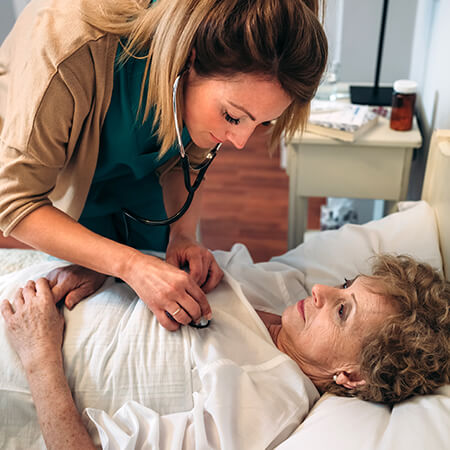


In the final stages of many life-limiting illnesses, care priorities tend to shift. Instead of ongoing healing measures, the focus often changes to comfort care - for the relief of pain, symptoms, and emotional stress. Ensuring a loved one's final months, weeks, or days are as good as they can be requires more than just a series of care choices. Anticipating the demands of end-of-life caregiving can help ease the journey from care and grief towards acceptance and healing.
In the late stages of a life-limiting illness, it becomes evident that in spite of the best care possible, your loved one is approaching the end of his or her life. It is at this time that the focus of care changes from one of healing and rehabilitation, to one of peace and comfort. Depending on the nature of the illness and the patient’s circumstances, this final stage period may last from a matter of days, to weeks, or months, or sometimes even several years. During this time, a licensed hospice care provider is essential to providing proper hospice care measures – those designed to soothe and comfort a client - can provide options such as medications to control pain and other symptoms, such as constipation, nausea, or shortness of breath.
Families often find the last stages of the life of their loved one uniquely challenging. Simple acts of daily care that had been easy and routine before, are then combined with complex end-of-life decisions – causing pain and feelings of bereavement. In addition to home health aides and hospice nurses, physicians and nursing home personnel, end-of-life caregiving requires support. Support for the family and friends who surround and comfort their loves ones on a daily basis. Newport Home Care provides that support in the form of both support to a licensed hospice provider, and respite care for the family caregiver.
It is important for the physical and mental health of both the patient and the caregiver, that the needs of both are identified and respected. Deciding what type of care is practical as conditions worsen, must be balanced with respecting the comfort and dignity needs of a client whose health is rapidly diminishing. Family caregivers have needs as well. Respite care is an important part of end of life services. We call this “care for the caregiver”. Grief support is also essential to the mental wellbeing of a family caregiver.
A terminally ill patient’s deteriorating medical condition, increased physical safety needs, and the 24-hour demands of final-stage care often mean the primary caregiver will need additional in-home help. In many cases, patients prefer to remain at home in the final stages of life, in comfortable surroundings with family and loved ones nearby.
While every patient and each family’s needs are different, multiple changes can be difficult for a terminally ill patient, especially one with advanced Alzheimer’s disease or other forms of dementia. It’s easier for a patient to stay at home before they’re at the end stage of their illness. In these situations, planning ahead is important.
Newport Home Care’s End of Life services were designed with both the patient and family in mind. Our Respite care services, designed with the family caregiver in mind, focus on providing relief to a family caregiver that may need time away. Our patient focused end of life care - preserving the comfort and dignity of our client amidst rapidly diminishing conditions - remains our priority.
We understand that when a family member passes, the need for comfort and support does not end. Newport Home Care is committed to providing continued care and grief support resources to those who are struggling with a loss. We understand that even with years of dedication to the care of a loved one, and the grief of knowing that death is imminent, families still struggle with being seemingly unprepared and surprised when their loved one finally passes away. Our grief support resources and referrals to counseling services and even religious guidance and direction, are all a part of our commitment to our clients and their families, even after loss of life.